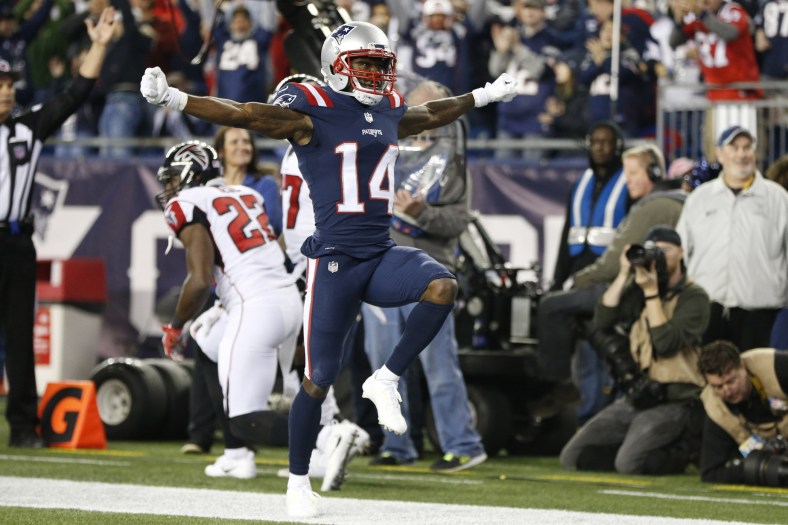
After 264 total games over 19 weeks there are only four teams left standing in the NFL. We’ve spent all year dissecting things from every angle, analyzing everything from the NFL Draft to the New England Patriots’ chemistry, all for this.
There are no more surprises left in the bag. We know these teams better than the back of our hands and they know each other even better than that. Despite an unorthodox trio of quarterbacks, these are the four best teams. That much is clear. Here are 10 X-factors that will decide who goes to Minneapolis in two weeks.
Brandin Cooks vs. Jalen Ramsey
There’s a certain extent to which the Jacksonville Jaguars can’t control Rob Gronkowski. Doug Marrone has said as much, and he’s right. But Jacksonville can control most everything else on defense, and that starts with Cooks. If New England can open up the field early with a streak or post route to Cooks, that might be the ballgame. Forcing Jacksonville to divert more resources to Cooks means forcing Jacksonville to divert less resources to Gronkowski.
However, the Jaguars have a solid answer in Ramsey, who can be trusted on an island against the 1,000-yard receiver. During the regular season, Ramsey was arguable the best cover corner in the league, allowing just 5.4 yards per pass on a 63 percent success rate, per Football Outsiders.
Even when Antonio Brown balled out against the Jaguars last weekend, it’s hard to pin that on Ramsey (or A.J. Bouye, who took his licks as well.) The biggest plays Brown made were flat-out absurd — the type only he can make. Nobody else is good enough to make superhuman plays like that.
As big a threat as Gronkowski poses, Jacksonville does have matchup advantages across the board in the secondary outside of him. Ramsey should be reliable in this spot. Bouye and Aaron Colvin are more than capable against Danny Amendola and Chris Hogan. Thing is, Jacksonville has to dominate all three matchups to stand a chance at Gillette. Their disadvantages when it comes to Gronkowski (and Dion Lewis) will be too much to counteract if not.
How do you solve a problem like Rob Gronkowski?
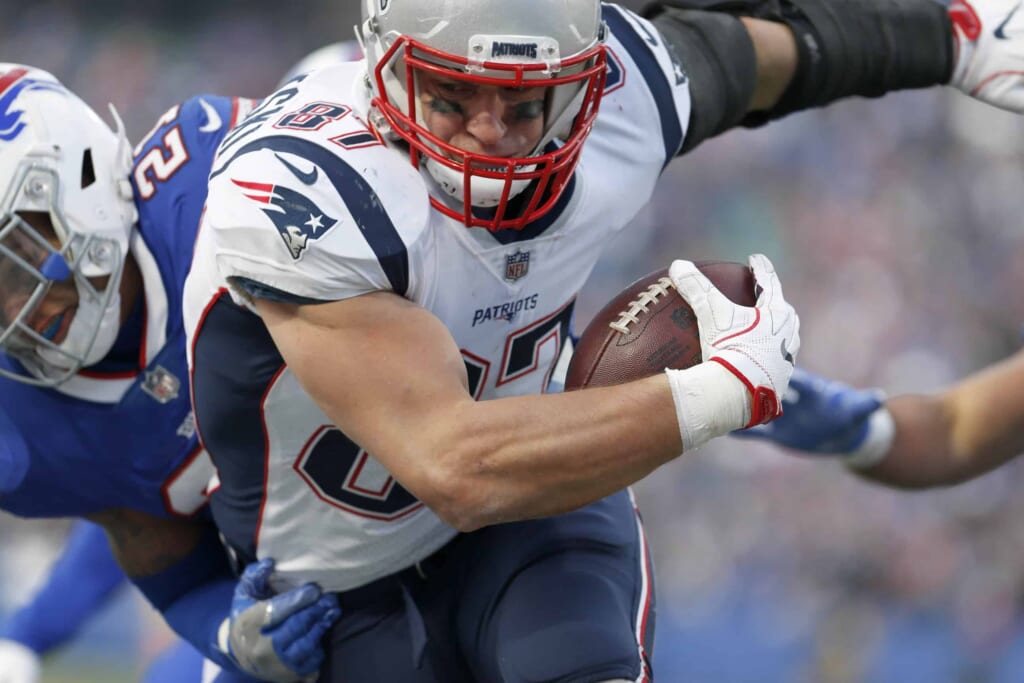
Impossible as this question is to answer, the Jaguars have no choice but try. Jacksonville is a woeful 20th in pass defense DVOA against tight ends this season, a deficiency on full display when Vance McDonald went for 112 yards on 10 receptions against it last week.
It doesn’t help the Jaguars that the first Cover-3 beater in the book is the seam route either. Gronkowski over the seam is already a menace. Against Cover-3, it gets that much easier.
How Jacksonville addresses this is anybody’s guess. Maybe the Jaguars toss two linebackers Gronkowski’s way. Maybe they leave one linebacker — likely Telvin Smith — or a safety on him the entire game, focusing the bulk of their attention elsewhere and letting Gronk get his. Maybe they go heavy on zone and pattern-match coverages.
To an extent, it doesn’t really matter. Gronkowski has been incredible against all of the above. Time and time again, it’s been clear that you can’t really take him away by gameplanning. But the Jaguars have to try.
The Patriots’ special teams advantage
Other than Gronkowski, the single-biggest advantage New England will have on Sunday may be on special teams. The Patriots rank third in special teams DVOA; the Jaguars 24th.
Though Josh Lambo has been a reliable placekicker for Jacksonville, hitting 19-of-20 attempts so far this season, he’s been one of the worst in the league at kicking the ball off. The Jaguars are 28th in average line of scrimmage following a kickoff. New England is third in average line of scrimmage after receiving a kickoff.
That seems like nothing, but similar disparities exist on punts and when New England is kicking off. These add up, especially in the type of low-scoring game Jacksonville wants to play. We all know that Bill Belichick loves special teams more than most people love their children. He’ll be licking his chops at the chance to exploit this on Sunday.
Which Blake Bortles are we getting?
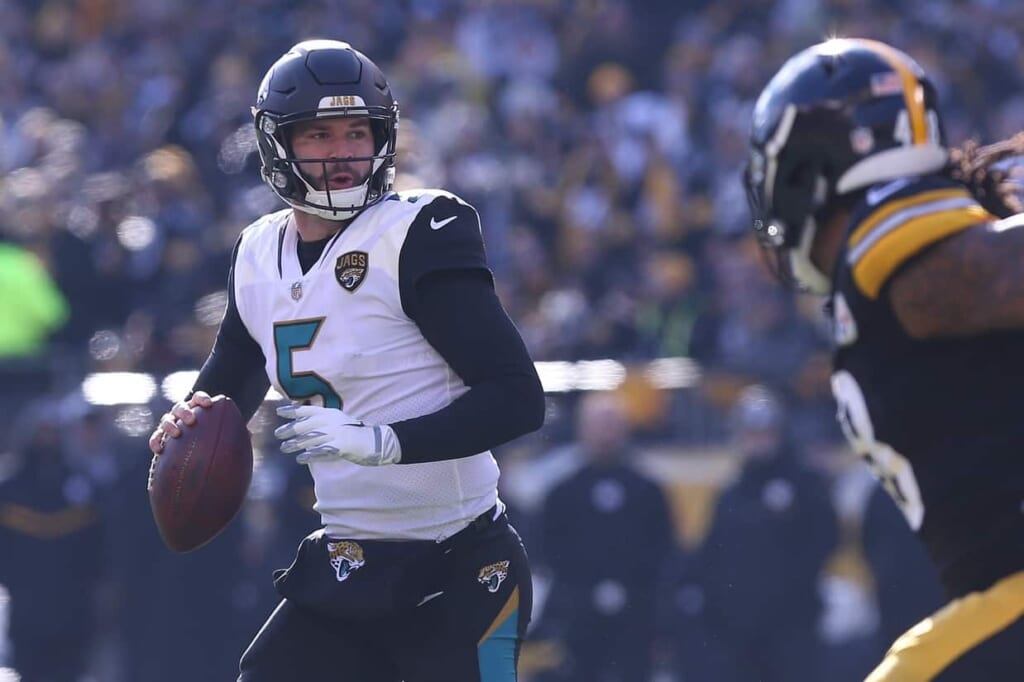
It’s not a matter of playing well for Bortles. It’s a matter of being adequate. Just look at his numbers against Pittsburgh: 14-of-26, 214 yards, one touchdown, and a 94.1 passer rating. Those numbers aren’t that good and the Jaguars scored 45 points on the road, in a playoff game, against a solid defense.
All Bortles has to do is demonstrate that he’s capable of making throws New England leaves open for him. Hit one of those early and the Patriots will be forced to take men away from the box. Nothing is more important to Leonard Fournette’s success in this game than Bortles.
Not only does Bortles hitting the Playoff Competency Bar mean Jacksonville will be able to run the ball, it means the Jags can set up play action. Jacksonville averaged nine yards per play action play this season, fourth in the league per Football Outsiders. Fournette is a terrifying force of nature who can affect the game like that without even playing particularly well. But unless the Jaguars get New England away from eight or nine-man boxes early in the game, that won’t make much of a difference.
Stopping Dion Lewis could be the Jaguars’ shortcoming
This is an important case of two somewhat contradictory things both being true: 1) Marcell Dareus greatly improved Jacksonville’s run defense and 2) Jacksonville’s run defense is still vulnerable.
The Jaguars were 13th in run defense DVOA during the back half of the regular season, per Football Outsiders — good, but not great. And nowhere near as good as the pass defense. Lewis is the type of back who gives even the best run defenses fits because of what he can do in tight spaces. It’s hard to find a more effective cutter than Lewis. He’s also impossible to bring down, frequently shaking off tacklers in tight spaces.
The element Lewis (and, for that matter, James White) brings to New England’s passing game is something the Jags could struggle with as well. Jacksonville is a pedestrian 15th in pass defense DVOA against running backs and the Patriots will force them to defend Lewis at the same time as Gronkowski.
There’s no disguising anything coverage-wise when Belichick lines both of them up as receivers. If you’re in man, it takes two defenders out of the middle of the field. If you’re in zone, have fun hoping Lewis doesn’t find a hole in it (he will). Being able to play these two at the same time is illegal in at least 12 states, or at least it should be. Forcing Jacksonville to defend running backs and tight ends instead of wide receivers will be a large part of what sends New England to a third Super Bowl in four years.
How much will Minnesota try to run?
All year, the Vikings have forced a run game despite not being especially good at running the ball. Minnesota ended the regular season second in total carries — partly a virtue of being ahead so often, but also because having a threatening run game helps out Case Keenum. However, the Vikings averaged just 3.9 yards per carry as a team — and that’s counting the four games where Dalvin Cook tore up the league before tearing his ACL.
Against the Saints, the Vikings stuck to that formula, handing it off 29 times for less than 100 yards. That was against an unreliable-at-best run defense. The Eagles rank third in run defense DVOA. This plan will not work if Mike Zimmer sticks to it. It’s no coincidence that Minnesota’s only loss after October 1 came against Carolina, a team which ranked sixth in run defense DVOA.
The Vikings need to be a pass-first team on Sunday. Running the ball straight into a front that features Brandon Graham, Fletcher Cox, Vinny Curry, Chris Long, and a slew of other good rotational players is asking for a 3-and-out. Sure, Minnesota’s defense probably isn’t going to let Nick Foles build a lead big enough that Minnesota has to abandon the run. But by allowing that possibility to even be mentioned, the Vikings would be playing on Philly’s terms.
The Eagles want nothing more than a low-scoring, run-the-ball, grind-it-out game because that’s the only game they can win with Foles under center. If the Vikings force Foles to throw the ball, they’re going to the Super Bowl. That much is obvious to anyone who’s ever watched Nick Foles play football after 2015.
Minnesota’s goal should be to put Foles in that situation. The way to do that is by coming out aggressive and throwing the ball.
Nick Foles’ reliability in a close game
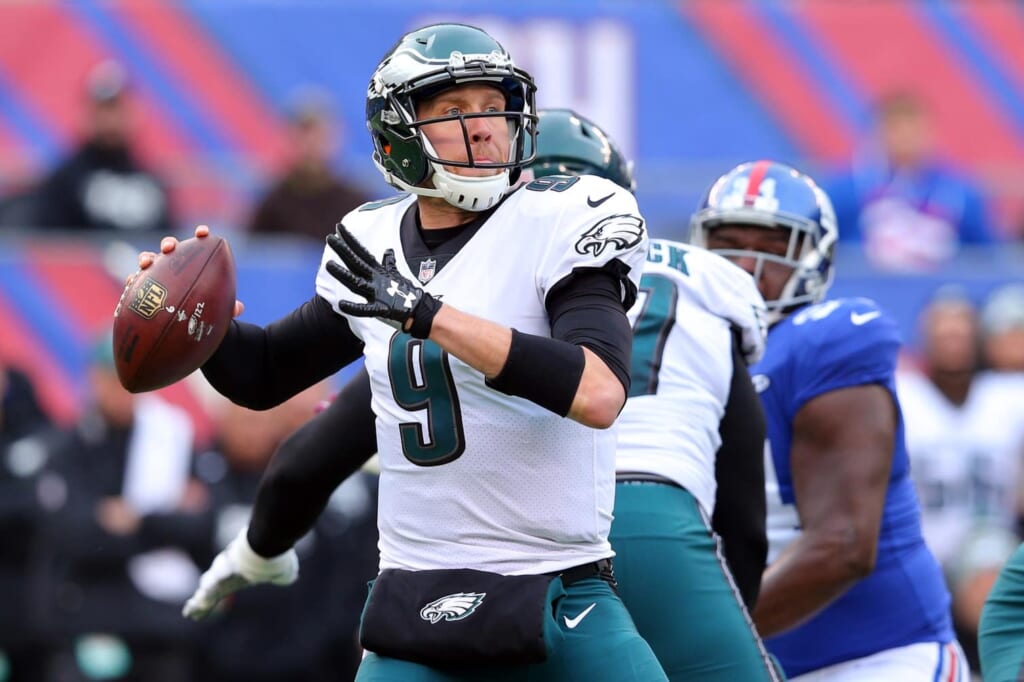
When you play as poorly as Foles did in the regular season, one half-decent playoff game doesn’t get you the benefit of the doubt. Sorry, that’s the rule.
Foles’ numbers were fairly similar to Bortles’, however, the Eagles put up just 15 points in a home game against the Falcons. Part of that has nothing to do with Foles — their defense didn’t create turnovers despite Matt Ryan handing them a few on a silver platter. However, the ultimate difference is that while teams may want to dare Bortles to beat them, they really want to dare Foles to beat them.
To his credit, Foles did that last week, thanks in large part to defense and an innovative gameplan from Doug Pederson, but a win is a win. However, Minnesota will be ready for the tricks Pederson pulled last week. At some point, Foles will need to make a throw for the Eagles to win this game — Philadelphia isn’t capable of blowing anybody out right now, let alone a team as good as Minnesota. And if you think he’s capable of doing that, you’re much more confident than this scribe.
Minnesota’s edge rushers vs. Philadelphia’s tackles
The specific matchup to watch here will be on the right side of the Eagles’ line: Lane Johnson trying to block Everson Griffen. It is vital that Johnson is able to win one-on-one against Griffen, one of the most disruptive passers in the league, because the matchup on the other side of the line is so lopsided in Minnesota’s favor.
Eagles’ left tackle Halapoulivaati Vaitai is out of his depth facing Danielle Hunter. Vaitai is a backup who struggles with regularity. He’s playing only because of injury to Jason Peters. Hunter has 40 pressures on the year, per Football Outsiders. Despite just seven sacks, he’s been dominant at times. Needless to say, Vaitai will need help.
That math, however, doesn’t necessarily work if Johnson can’t beat Griffen one-on-one. Unless the Eagles keep a tight end or running back to block on every play, they can only help on one of the two if Minnesota is rushing four. Leaving Vaitai on his own is a suicide mission, and if Griffen is getting to Foles, Pederson may have no choice but to do it.
Can the Eagles stop Stefon Diggs and Adam Thielen?
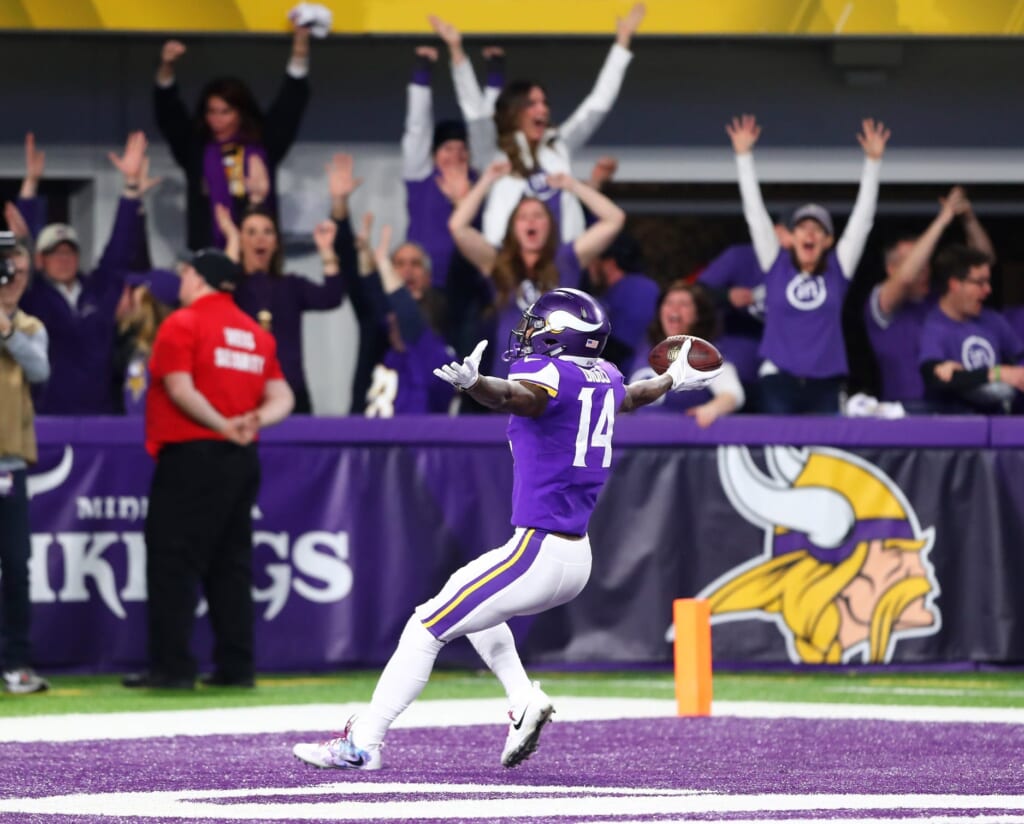
The Saints were able to complete this task — saving for a handful of pass interference penalties — for 59 minutes and 50 seconds last week, and we all saw where that got them.
Philadelphia’s matchups in the secondary aren’t quite as good as New Orleans’, but slowing down this duo is more than possible. Patrick Robinson has been one of the best corners in the league this season. Rookie Rasul Douglas ranked top-30 in success rate, per Football Outsiders, and looks like a potential star. It’s hard to trust Jalen Mills, but the numbers like him well enough.
The margin for error, however, is as thin as a Post-It note. Slip up for just a second and either Diggs or Thielen will streak by you and take it to the house. Just ask Marcus Williams.
Philly’s pass rush needs to hit home
Sometimes, it really is that simple: the best way to slow down Case Keenum is to pressure him. The Vikings have excelled at taking Keenum out of those situations this season — they’re 28th in pressure rate, per Football Outsiders.
However, there are vulnerable spots on the offensive line. Right tackle Mike Remmers morphs into a turnstile against better pass rushers. Center Pat Elflein has shown growing pains his first year in the league. Graham and Cox will be going against those two on a large portion of their snaps on Sunday. This is a matchup advantage if there ever was one.
Surprisingly, Keenum doesn’t get the ball out especially fast. At an average of 2.78 seconds before releasing the ball, he’s one of the slower quarterbacks in the league, per the NFL’s Next Gen Stats. The Eagles can get to him if they win those matchups — and they should. Getting pressure on Keenum would alleviate the Eagles’ secondary of a massive burden and allow the game to get ugly. Nothing should make Philadelphia happier than that.